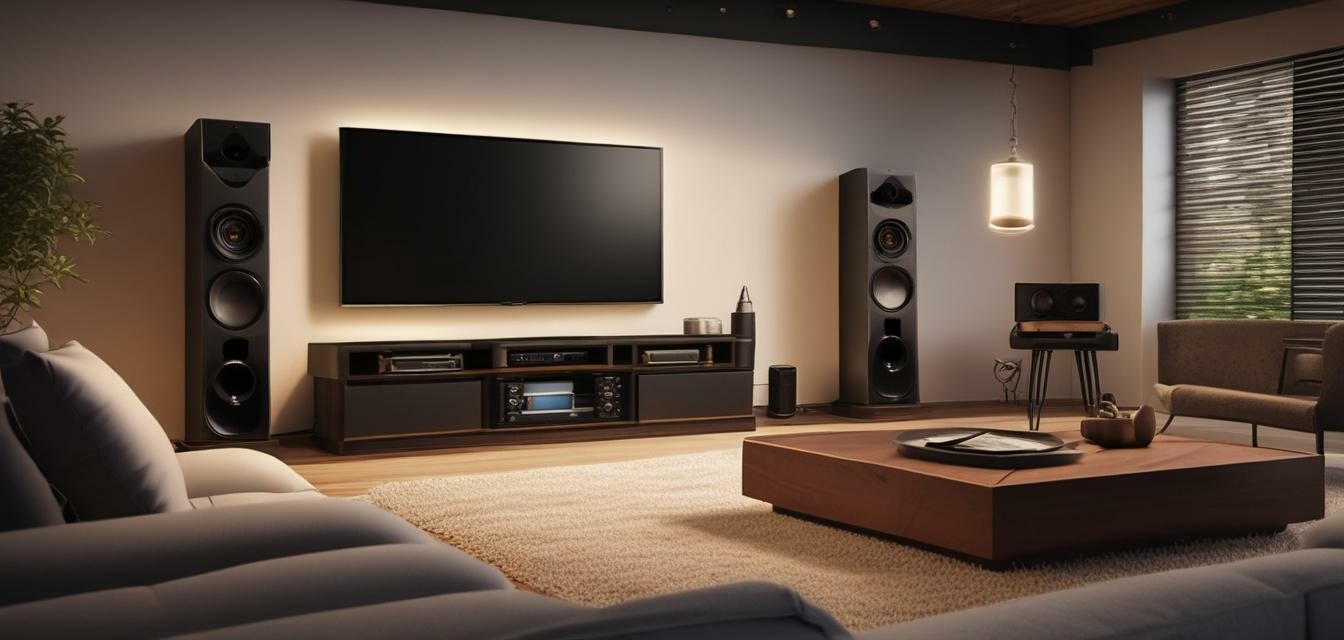
Sustainability in Home Theater Systems
- Growing demand for eco-friendly home theater products.
- Key trends include energy efficiency, sustainable materials, and waste reduction.
- Smart home integration plays a crucial role in enhancing sustainability.
- Brands are increasingly prioritizing eco-conscious practices in design and production.
- Installation professionals are adapting to new sustainability standards.
As technology advances, the conversation around sustainability in home theater systems is becoming more prominent. With a rise in awareness about the environment and its challenges, a focus on green products and practices is not just a trend but a necessity. From energy-efficient devices to sustainably sourced materials, the home theater industry is evolving to meet the growing consumer demand for eco-friendly solutions. In this article, we will explore the current trends in sustainability within home theater systems, including the use of renewable materials, energy-efficient technologies, and the integration of smart home solutions.
Trends in sustainable home theater technologies
The shift towards greener home theater systems encompasses various key elements, including:
- Energy-Efficient Appliances
- Eco-Friendly Materials
- Smart Home Integration
- Sustainable Packaging Solutions
- Waste Reduction Practices
1. Energy-efficient appliances
Energy efficiency is at the forefront of sustainable home theater systems. Consumers are increasingly looking for appliances and devices that minimize energy consumption without compromising performance. Many brands are now offering products that are Energy Star rated or carry similar certifications. These products help reduce electricity costs while also supporting environmental initiatives.
2. Eco-Friendly materials
Manufacturers are beginning to prioritize sustainable materials in their products. This includes:
- Recycled plastics
- Bamboo and other renewable composites
- Low-emission paints and adhesives
These materials not only help reduce the carbon footprint of home theater systems but also meet consumer demand for environmentally responsible products.
3. Smart home integration
Smart home technology plays a crucial role in enhancing sustainability in home theaters. By utilizing automation and smart systems, users can optimize energy consumption and streamline their home theater setup. For instance, smart lighting can adjust brightness based on the time of day, while smart plugs can schedule device usage to non-peak hours, reducing energy costs significantly.
4. Sustainable packaging solutions
Alongside sustainable product development, manufacturers are reassessing their packaging strategies. Many companies are transitioning to biodegradable or recyclable materials for packaging to minimize waste and environmental impact. This not only enhances the overall sustainability of the products but also appeals to eco-conscious consumers.
5. Waste reduction practices
Waste reduction is another aspect of sustainability that home theater professionals are adopting. This includes:
- Offering recycling programs for old equipment
- Implementing take-back initiatives
- Encouraging the repair of existing devices rather than outright replacement
Such strategies effectively reduce landfill waste and promote a more circular economy.
Implementing sustainable practices in installations
To embrace sustainability in home theater setups, installation professionals are now using various tactics:
- Conducting energy audits to evaluate consumption
- Recommending energy-efficient designs and layouts
- Adopting best practices for waste disposal and resource conservation
By incorporating these practices, homeowners can achieve high-performance systems while also contributing positively to the environment.
The future of sustainability in home theater
The momentum towards sustainability in the home theater industry is only expected to grow. As technology continues to evolve, we can anticipate more innovations focused on reducing environmental impact. The future may include:
- Smart systems that automatically optimize energy usage
- Increased availability of sustainable products
- Greater consumer awareness and demand for eco-friendly solutions
By staying informed of these trends, you can help shape a more sustainable future in the world of home theater.
Conclusion
As we embrace sustainability in our home theater systems, consumers, manufacturers, and installation professionals must work together to promote eco-friendly practices. From energy-efficient appliances to the use of sustainable materials, the future of high-end home theater technology looks bright and green.
Pros
- Reduces energy consumption and costs.
- Utilizes sustainable and eco-friendly materials.
- Promotes smart home automation for better efficiency.
- Addresses consumer demand for environmentally responsible options.
Cons
- Potential higher initial costs for eco-friendly products.
- Limited availability of certain sustainable technologies.
- Requires consumer education and awareness.
For more information on how to create an energy-efficient home theater, visit our insightful setup tips blog.
Stay updated with the latest trends and innovations in high-end audio technology by checking our news and trends section.
Explore our detailed guides on home audio & theater products and discover the best home theater receivers for your needs.
You can also learn about acoustic treatments and accessories to enhance your home theater experience.
Looking for cables and connectivity solutions? Dive into our cables and connectivity solutions page.

